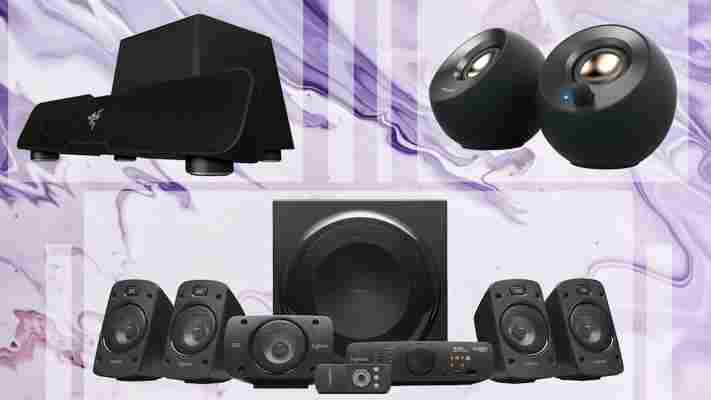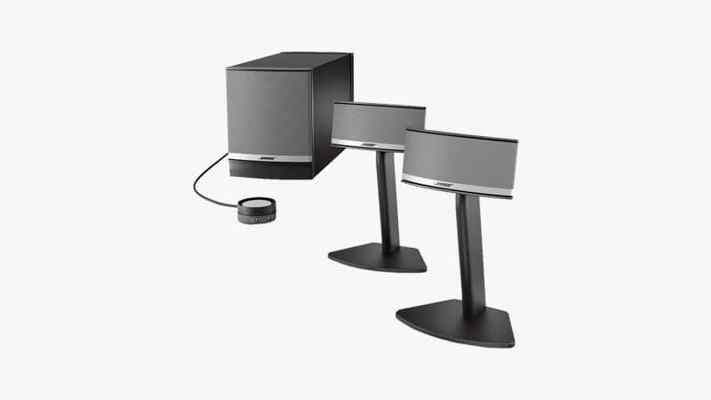The best PC speakers for any budget
PC speakers are a favourite computer accessory of ours because they tread the elusive line between being essential and exciting.

Whether you like a little background music while you work or you want to shake the walls while gaming, you're going to need some quality PC speakers. There are many different options on the market, all claiming to deliver incredible sound. Logic dictates that they can’t all be right, so to cut through to the options that matter, we’ve rounded up the best PC speakers.
Thankfully, there’s an impressive selection available. So no matter your need, desire, or budget, there’s going to be something here that fits the bill.
Dramatically enhance your cinematic experience with The best floor-standing speakers for the ultimate bass, precise sound, and intense atmosphere, unlike anything you've experienced before.
The advantages of PC speakers
You need speakers to get the most out of a computer, be it a laptop, tablet, or desktop PC. Audio cues for alerts and notifications are important, helping you to stay on top of emails and chats, as much as OS and security updates.
In addition to this useful service, speakers offer a real boost to anything involving audio. Voices of video calls are given greater presence and clarity, music is enlivened with richer tones and thicker bass, and the drama of video content is provided with the weight and grandeur it deserves.
Experience the very best audio quality money can buy with the best hi-fi speakers of the year at an affordable price.
The best PC speakers shortlist:
Listening in private? Read up about the best headphones
A quick note on inbuilt speakers…
Laptops, tablets and some monitors come with inbuilt speakers – so why would you need some more? Well, these speakers are okay for notifications and quick video chat, but anyone spending more than a few minutes working or streaming will quickly realise that they won’t do.
In-built speakers are often very quiet and produce only a thin, scratchy and tinny sound. External speakers are bigger in both size and power. To simplify the science behind this difference, larger speakers means a wider frequency range is available – thus much louder and better quality audio.
Part of a laptop or tablet’s appeal is that they are all-in-one devices and don’t take up too much space. Thankfully, there are low-fuss and compact high-performance speakers that won’t diminish this convenience, such as the Creative Pebble V2 or Logitech Z120 Laptop Speakers.
A little something extra for PC gamers
PC gamers will already know the importance of a strong audio setup. After splashing out on one of the best gaming rigs and gaming monitors, it makes sense to take good care of the sound, too. The list below includes some surround sound options that are sure to appeal. Elsewhere, we’ve also rounded up the best gaming headsets and the best gaming speakers under £100, offering a curated selection of affordable speakers tailored specifically to gaming needs.
The best PC speakers in detail:
Best for: everyday versatility
Pros Cons • Affordable • So-so distinction between mids and bass • Good sound profile • Plenty of volume
Specifications Connections: 3.5mm aux Powered: Mains Speakers: 10W
Best for: gamers on a budget
Pros Cons • Great sound • Lacking bass • Good audio space • Small desk footprint
Specifications Connections: 3.5mm aux Powered: Mains Speakers: 3-inch drivers
Best for: anyone wanting to save money and space
Pros Cons • Cheap • Not for large spaces • Portable • High volume distortion • Well-built
Specifications Connections: 3.5mm aux Powered: Mains Speakers: 2-inch driver, 8W standard, 16W boosted
Best for: anyone wanting clear, strong bass
Pros Cons • Excellent build • Bass can be OTT when cranked • Fun sound profile • Reasonable cost
Specifications Connections: 3.5mm aux, RCA Powered: Mains Speakers: 80W
Best for: anyone with a home studio setup
Pros Cons • Clean sound • Low-end bass can be thin • Accurate • Great style
Specifications Connections: 3.5mm aux, RCA, ¼ TRS Powered: Mains Speakers: 3.5-inch bass driver, 1-inch tweeter, 25W
Best for: gamers who like RGB
Pros Cons • Low-fuss • RGB isn’t for everyone • Well-built • Great audio
Specifications Connections: 3.5mm aux, USB, Bluetooth Powered: Mains Speakers: 250W
7. Razer Leviathan Recommended ebay View offer Slide 1 of 0 Description Razer's Leviathan soundbar sits underneath your monitor to deliver an onslaught of Dolby virtual ... read more Slide 1 of 1 View offer
Best for: an immersive viewing and gaming experience
Pros Cons • Compact 5.1 • Takes up desk space • Cable channel • Powerful sound
Specifications Connections: 3.5mm aux, Bluetooth, optical Powered: Mains Speakers: 30W soundbar, 30W subwoofer
Best for: laptops on the move
Pros Cons • Good for speech • Weak on music at volume • Low-fuss • Portable
Specifications Connections: 3.5mm aux Powered: USB Speakers: 1.2W
Best for: anyone wanting a speaker with a sleek aesthetic
Pros Cons • Great sound • Soundbar takes up desk space • Low price • Thin subwoofer
Specifications Connections: 3.5mm aux, Bluetooth, optical, HDMI ARC, USB Powered: Mains Speakers: 160W
Best for: audio versatility
Pros Cons • Excellent audio • Not a ton of bass • Excellent soundscape • Precise, crisp and loud sound
Specifications Connections: 3.5mm aux Powered: Mains Speakers: 14-Watt dual speaker
Best for: practicality and a compact set-up
Pros Cons • Reliable • Not all the exciting • Compact • Pleasant audio
Specifications Connections: 3.5mm aux, optical, USB, Bluetooth Powered: Mains Speakers: 2.75-inch driver 80W
Best for: a cinematic, immersive experience
Pros Cons • High-fidelity sound • Expensive for PC • Tonnes of volume • Takes up a lot of space • Wireless remote
Specifications Connections: 3.5mm aux, RCA, six-channel direct, digital coaxial, optical Powered: Mains Speakers: 1000W
Speakers are all well and good, but if you're in a public space or working late into the night, what do you do then? You simply pop on a pair of the best wireless headphones. If you're particularly keen to focus on and silence the outside world, you could even opt for the best noise-cancelling headphones.
Buyer's Guide: Frequently Asked Questions
What are the best budget PC speakers?
If you’re looking to spend under £30, but want a mains powered speaker, we’d recommend the Logitech Z200. They’re affordable and offer a good solid sound profile with plenty of volume.
If you want something on the go with a laptop, then the Creative Pebble V2 Speakers are a fine choice, with a minimalistic styling and decent audio performance.
Experience high refresh rates and stunning visuals with The best budget monitors available on the internet.
What are the loudest PC speakers?
The loudest speakers on our list are, without a doubt, the Logitech Z609. With seven satellites, a hefty sub and 1000w to play with, it’s hard to argue against its volume and quality.
If you’re looking for a low-key setup, the Razer Leviathan packs a punch without taking up too much desk space.
What to look for when buying PC speakers
Before you click ‘Confirm’ on your new PC speakers, there are several things that are worth considering. The first thing is pretty clear: cost. That, naturally, is up to you, and we’ve made sure our selection offers the best in every price bracket.
Secondly, size. A larger size speaker tends to mean more volume and higher quality audio, however, it also means that the speakers will take up more space. If you’re working on a small desk, there’s no point in opting for a 7.1 surround sound option that’s going to take over your workspace. So, consider the speaker's footprint.
Thirdly, power. As in, how are the speakers powered? If you’re looking for an option that can be transported with ease or won’t take up any more valuable mains sockets, then a USB-powered speaker is going to be for you. Those who have the plugs, space and forgiving neighbours will be able to opt for a mains powered product.
Pick yourself up an awesome budget keyboard that's perfect for work, gaming, or casual browsing.
2.1, 5.1 and 7.1 speakers explained
©What's The Best
Everyone should be pretty familiar with the idea of stereo audio - this is when you get audio that plays out of a left and a right channel playing from a left and a right speaker. The effect of stereo is to put the listener in the centre of the action and give greater clarity to the audio. This stereo audio is also called a two-channel stereo or 2.0.
2.1 speakers - When a subwoofer is added to stereo audio to take care of the bass frequencies, a 2.0 speaker becomes 2.1. For most people listening to music, gaming or watching films on their PC, this setup will be the easiest to arrange while still providing a great audio experience.
5.1 speakers - Some PC speakers add even more channels to create a surround sound system. A 5.1 speaker system has five speakers and one subwoofer, with each speaker taking on a specific responsibility. Typically, the Centre speaker projects vocals and dialogue while the Left Front and Right Front speakers handle the main bulk of the audio. Then there are two more speakers, Left Rear and Right Rear, which add to the atmosphere by projecting ambient sounds, sound effects and far-panned audio. It’s ideal for immersing the listener in movies, games and music.
7.1 speakers - A 7.1 speaker system add two more speakers into the mix, taking the audio played by the rear two speakers of a 5.1 speaker system and splitting it up even more. This arrangement creates an even more accurate sense of direction and immersion.
Are USB speakers better?
There are two types of USB speakers: those that are USB powered, rather than via a mains plug, and those that use the USB connection to transfer the audio data, replacing the traditional 3.5mm headphone-style auxiliary connection.
USB powered speakers are a popular choice for those looking for a low-fuss setup. The power passes through a PC or laptop’s USB port, so there’s no need to find an extra mains socket. However, the power from a USB port isn’t that high, so if you’re looking to pump up the volume, you’re going to find USB-powered options pretty limited when compared to their much more substantial, mains powered brethren.
Streamline your PC setup with The best wireless speakers of the year - high quality sound, ultra-bass, and crisp sound all for a low price.
USB connections that replace 3.5mm headphone jacks are interesting. A USB connection bypasses the computer’s soundcard and relies on what’s in the speaker system to process its information. It also provides a clean digital signal, whereas the 3.5mm is analogue, and therefore is more prone to interference. However, the average user isn’t really going to find any problem with 3.5mm units, as contemporary ports and connections tend to be high quality and well insulated.
What matters is the sound. Both USB and 3.5mm are capable of producing excellent sound quality. It doesn’t matter whether which one you go for, so long as it sounds good and works for you.
Looking to start streaming? Here are the best microphones for streaming.
What is bass, midrange and treble?
Bass, midrange and treble are sometimes referred to as lows, mids and highs. These terms refer to the different sound frequencies found in audio.
Bass, low or lo, is the boomier sections of sound, the frequencies that people can most often 'feel' - bass drums are an example of low frequencies. Without bass, audio sounds very empty and 'tinny'. Too much bass and music can sound rumbly, overpowering and woolly.
Midrange, middle or mid, is all the stuff that happens in the middle - guitars, vocals and speech. Balancing this with bass really brings audio to life. If you struggle to hear vocals in music or conversation in podcasts, boosting the midrange can bring these out for you without having to play with volume.
Treble, highs, or hi, is the highest frequencies. These are important for picking out details in audio, but if they are too high they can annoy and be painful to listeners – overpowering treble gives audio the dreaded tinny sound
What’s Dolby Atmos, DTS and DTS:X?
They're technologies from competing companies that reach the same goal. An object-based sound system that offers the impression of being in the centre of the action. Sound is given the impression of coming from all around, including above. It’s ground-breaking and extremely immersive.
What's THX certified?
If an audio system is THX certified it means that it has undergone vigorous and thorough testing to guarantee an extremely high level of performance that matches those expected of cinemas. The audio you hear will be the audio that the sound engineers intended.
William Lobley is a Senior Content Writer and reviewer for WhatsTheBest, specialising in technology, gaming, and outdoors. He also writes for Empire Online.
The 18 Best Computer Speakers for 2023 + Editors Pick
Whether you want computer or laptop speakers for home use or the office, for listening to music while you cook or for routing a conference call to a room full of executives, the requirements for a good set of speakers do not change. Here are five important qualities you should look for in any speaker.

1. Volume Control
This may sound obvious, but the best computer speakers are able to cover a wide range of decibels. This is one way in which dedicated computer speakers are superior to headphones, as many headphones have poor volume control, being either too loud or too quiet.
2. Sound Quality
Another obvious but critical feature, and one that is surprisingly easy to overlook. This is especially important when you need speakers to project loudly, perhaps for a conference call in a large room. You don’t want your speakers to distort the sound or crackle when the volume is turned up too high, so be sure to look out for speakers with good quality sound.
3. Tweeter and Subwoofer
A tweeter is essential for capturing high-pitched sounds, and a woofer is needed to accurately capture low notes and deep bass. How important these different pitches are will depend from person to person, but it’s a good idea to have speakers that let you control these levels.
4. Stereo or Surround
This is a big decision for a lot of people, and a lot of it depends on what you need to use your speakers for. If you’re just working in an office, you’ll be fine with stereo audio, but surround sound will improve audio quality in larger areas.
5. Size
The size of your speakers is important. Some of the best computer speakers can be quite large, and if you don’t have a lot of room, you may want to opt for a smaller set. Larger speakers are more appropriate for a conference room or any other large area.
Speaker Reviews: Best of 2023
Your browser is not supported or outdated so some features of the site might not be available.

105 Speakers bought and tested Supported by you via Supported by you via insider access , and when you purchase through links on our site, we may earn an affiliate commission.
We are hiring! Driven by data, run by a passionate team of engineers, testers, technical writers, developers, and more.











